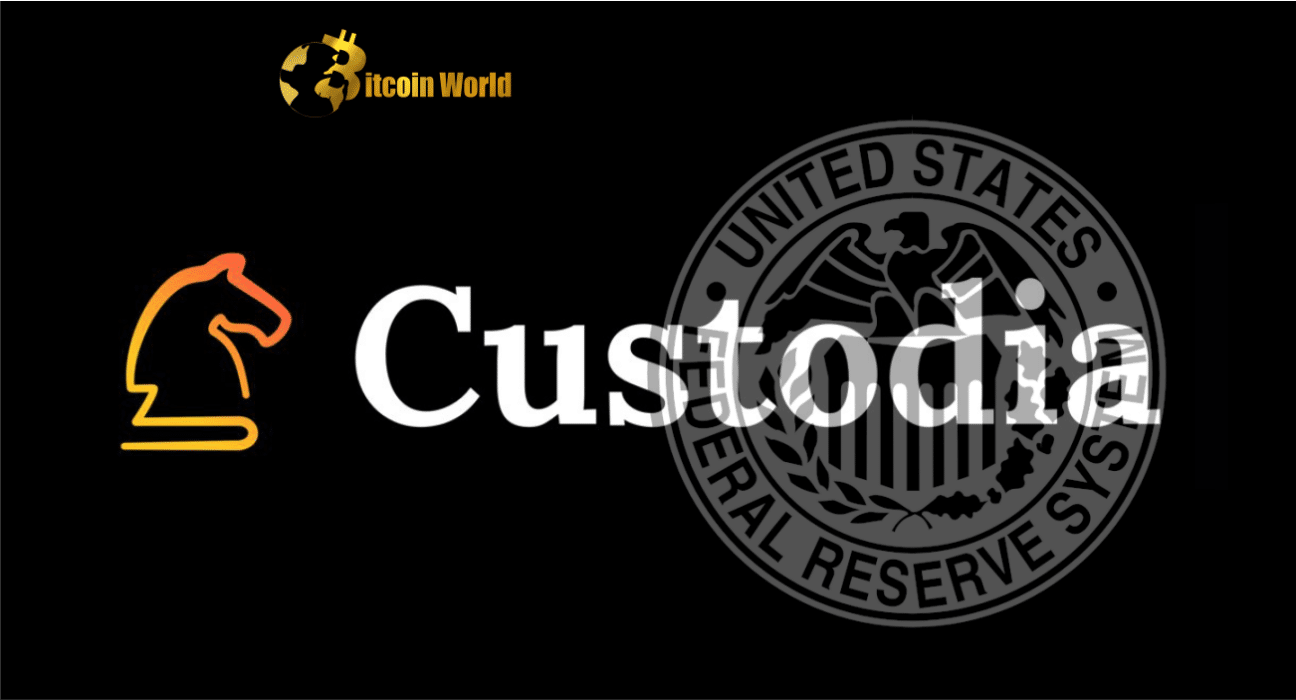The crypto world is no stranger to regulatory hurdles, but the latest news involving Custodia Bank and the U.S. Federal Reserve (Fed) has sent ripples through the industry. In a significant development, the Fed has denied Custodia Bank’s application for supervision, raising questions about the future of crypto-friendly banking and the relationship between traditional finance and digital assets. Let’s dive into what happened and what it means.
What Exactly Happened with Custodia Bank and the Fed?
For those unfamiliar, Custodia Bank, spearheaded by crypto pioneer Caitlin Long, aimed to bridge the gap between the crypto world and traditional banking. Their application to come under the Federal Reserve’s supervision was a key step in this direction. However, the Fed has officially turned down this application.
While the official order detailing the decision is still under review for confidential information, the core reasons for the denial have been outlined. Essentially, the Fed expressed ‘concerns’ about Custodia Bank’s business model, which is heavily focused on the crypto sector.
Here’s a breakdown of the Fed’s key concerns:
- Sector-Specific Focus: The Fed believes that banks concentrating on a single sector like crypto are inherently more vulnerable to economic shifts and regulatory changes within that specific industry.
- Uninsured Depository Institution: Custodia Bank is not insured by the Federal Deposit Insurance Corporation (FDIC). The Fed views this as potentially posing greater risks to depositors and the broader financial system.
- Avits – A Stablecoin-Like Proposition: Custodia Bank proposed issuing ‘Avits,’ dollar-denominated tokens designed as programmable electronic instruments and deposits under federal banking law. The Fed noted that while not termed ‘stablecoins,’ Avits share functional similarities with stablecoins like Tether USDT and USDC, raising concerns about their potential risks, especially regarding illicit activities.
Custodia Bank’s Response: Fighting Back Against the Fed’s Decision
Custodia Bank hasn’t taken this setback lying down. Founder Caitlin Long and the bank have strongly responded to the Fed’s decision, highlighting what they perceive as flaws in the Fed’s reasoning and process.
Key points from Custodia Bank’s response include:
- Emphasis on Full Solvency: Custodia Bank emphasizes its commitment to a highly solvent model, proposing to hold $1.08 in cash for every dollar of customer deposits. This is presented as a more conservative and safer approach compared to traditional fractional reserve banking.
- Need for Modern, Adaptive Banks: Custodia argues for the necessity of banks that can serve rapidly evolving industries like fintech and crypto, adapting to customer demands and technological advancements. They see themselves as fulfilling this crucial role.
- Allegations of Bias and Procedural Issues: Custodia Bank claims ‘procedural abnormalities, factual inaccuracies, and a general bias against the crypto industry’ in the Fed’s decision-making process. They also allege ‘coordinated attacks’ and leaks of confidential information by the Fed.
- Potential Legal Action: Hinting at a possible legal battle, Custodia suggests they may need to resort to court action to ‘vindicate its rights’ and ensure the Fed ‘complies with the law’ regarding their application.
Why Does This Denial Matter for the Crypto Industry?
The Fed’s denial of Custodia Bank’s application is more than just a setback for one company. It carries broader implications for the crypto industry:
- Regulatory Scrutiny Intensifies: This decision signals continued and potentially heightened regulatory scrutiny towards crypto-focused financial institutions from U.S. regulators.
- Challenges for Crypto-Traditional Finance Integration: It highlights the difficulties in integrating crypto businesses with the traditional banking system, despite the growing demand for such services.
- Stablecoin Concerns Persist: The Fed’s concern over Avits, even though Custodia differentiates them from stablecoins, underscores the ongoing regulatory apprehension surrounding stablecoins and similar digital assets.
- Impact on Innovation: Some argue that such rejections could stifle innovation in the crypto space by making it harder for new, compliant crypto-friendly banks to emerge and operate within the existing financial framework.
Looking Ahead: What’s Next for Custodia Bank and Crypto Banking?
The path forward for Custodia Bank is uncertain. They may pursue legal avenues to challenge the Fed’s decision. The broader question is, what does this mean for the future of crypto banking?
Potential Scenarios:
| Scenario | Implications for Custodia Bank | Implications for Crypto Banking |
|---|---|---|
| Legal Challenge | Custodia could fight the decision in court, potentially leading to a reversal or further scrutiny of the Fed’s regulatory approach. | A legal battle could set precedents for how regulators treat crypto banks in the future. |
| Revised Application | Custodia might revise its business plan to address the Fed’s specific concerns and reapply for supervision. | Future crypto bank applicants might need to preemptively address similar concerns in their applications. |
| Operating Without Fed Supervision | Custodia may choose to operate without Fed supervision, focusing on its Wyoming state charter and exploring alternative regulatory pathways. | Could lead to a two-tiered system where some crypto banks operate outside the traditional Fed framework, potentially limiting their scope and access. |
Conclusion: A Turning Point for Crypto and Regulation?
The Custodia Bank situation is a pivotal moment in the ongoing dialogue between the crypto industry and regulators. It underscores the existing tensions and the need for clearer regulatory frameworks that can accommodate innovation while addressing legitimate concerns about risk and stability.
Whether this denial marks a significant setback or a catalyst for more constructive engagement remains to be seen. One thing is clear: the conversation around crypto regulation and its integration into the traditional financial system is far from over, and Custodia Bank’s case will likely play a significant role in shaping its future.
Disclaimer: The information provided is not trading advice, Bitcoinworld.co.in holds no liability for any investments made based on the information provided on this page. We strongly recommend independent research and/or consultation with a qualified professional before making any investment decisions.


